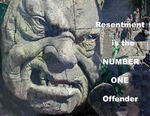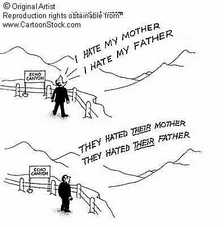Bishop Gregory J. Mansour recently wrote this piece on resentment for the Maronite Voice, the monthly magazine for the two Maronite eparchies in the United States. I think this brief article on resentment is helpful and will open new doors as to how we know ourselves and relate to others. For me it is clear, if we get our "house in order" then living as are made for becomes easier.
Thirty years ago, in his ground-breaking book on spirituality, the late Father Henri
 Nouwen described the spiritual life as a series of interior movements in which we go beyond our own self-centered plans in order to reach a deeper communion and authentic love for God and others. The book is appropriately entitled Reaching Out.
Nouwen described the spiritual life as a series of interior movements in which we go beyond our own self-centered plans in order to reach a deeper communion and authentic love for God and others. The book is appropriately entitled Reaching Out.
A movement "from resentment to gratitude" is described in the book. Father Nouwen says we ought to move from resenting the fact that we were not chosen, not honored, not loved or treated well, to a newfound gratitude for what we have been given, even a gratitude for the valuable lessons we learned from ill treatment. This can only happen when we are honest with ourselves and have the courage to feel once again our hurts and admit that God's grace brought us through. In this way we maintain balance and can love others with a clean heart and peace of mind.
This "re-sentiment" (which literally means "feeling again") allows us to bring all our hurts and disappointments to God, Healer and Lover of Mankind, and to turn from a bitter resentment to an inner peace and gratitude.
The destructive power of resentment abounds in society and even in the Church but so,
 too, can gratitude. A deep spiritual conversion can take place with God's grace, even in those who have been harshly treated. We see this in the lives of those who forgave their tormentors in war and imprisonment. Likewise, we see it in the lives of those whose sons, daughters, parents, spouses or friends have been innocently harmed or even killed. There are many examples of awe inspiring forgiveness from those who have been hurt, deprived, or disappointed and yet have found the power to forgive and to live the presence of God in peace and gratitude. It is true also of the like of the saints, from St. Stephen to the martyrs of today.
too, can gratitude. A deep spiritual conversion can take place with God's grace, even in those who have been harshly treated. We see this in the lives of those who forgave their tormentors in war and imprisonment. Likewise, we see it in the lives of those whose sons, daughters, parents, spouses or friends have been innocently harmed or even killed. There are many examples of awe inspiring forgiveness from those who have been hurt, deprived, or disappointed and yet have found the power to forgive and to live the presence of God in peace and gratitude. It is true also of the like of the saints, from St. Stephen to the martyrs of today.
The seeds of new life and peace are present in every difficulty but we cannot see them without the belief in the power of love and a loving God. We must believe God's grace can transform resentment into a life-giving gratitude. This is the meaning of the Cross. Resentment kills, but if we have the courage to face our resentments honestly and to reach out in love, then in the power of the Spirit of Jesus Christ, a sense of gratitude can bring new life, and as Jesus said, " I came to give life, life in abundance" (John 10:10).
This article was first published in the Maronite Voice in August 2008.
 About the Author The Most Reverend Gregory John Mansour is the third eparch of the Eparchy of
Saint Maron, Brooklyn. A native of Flint, Michigan, Mansour was educated at Western Michigan University, Our Lady of Lebanon Maronite Seminary, the Catholic University of America, and finally at the Pontifical Gregorian University. He is a teacher of Spiritual Theology. Pope John Paul II named Bishop Gregory to the Brooklyn eparchy in 2004.
About the Author The Most Reverend Gregory John Mansour is the third eparch of the Eparchy of
Saint Maron, Brooklyn. A native of Flint, Michigan, Mansour was educated at Western Michigan University, Our Lady of Lebanon Maronite Seminary, the Catholic University of America, and finally at the Pontifical Gregorian University. He is a teacher of Spiritual Theology. Pope John Paul II named Bishop Gregory to the Brooklyn eparchy in 2004.

